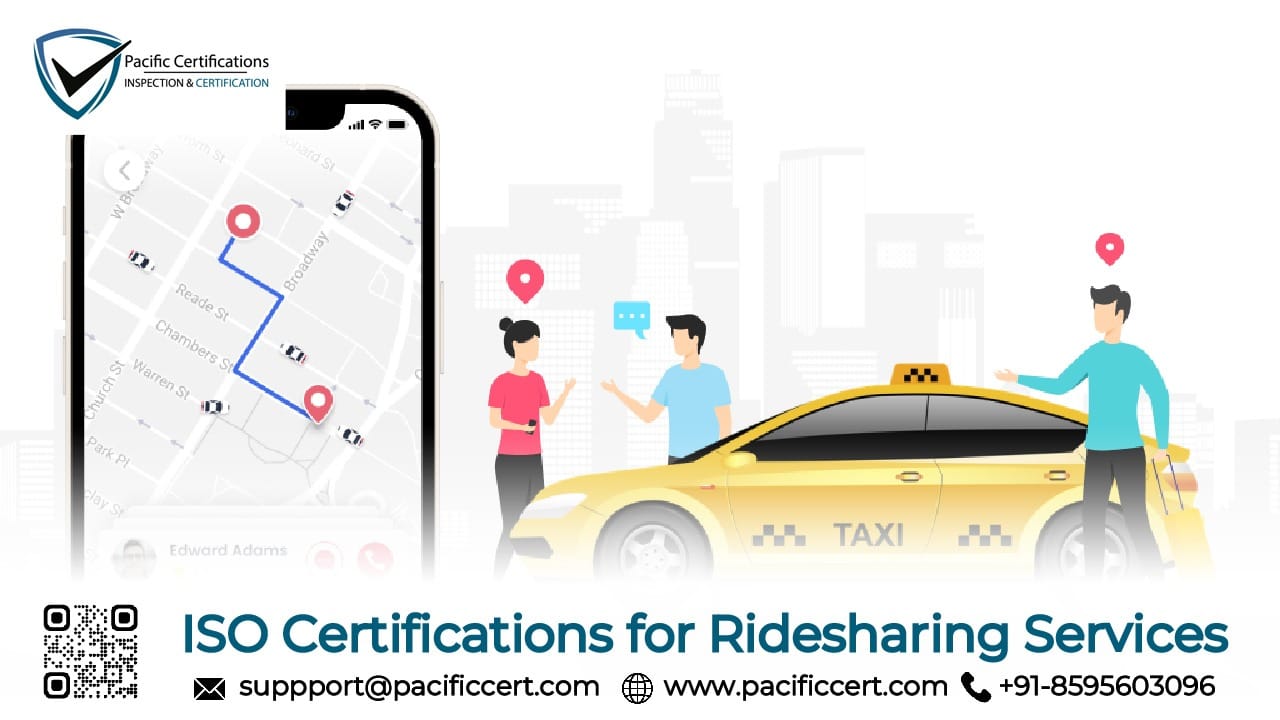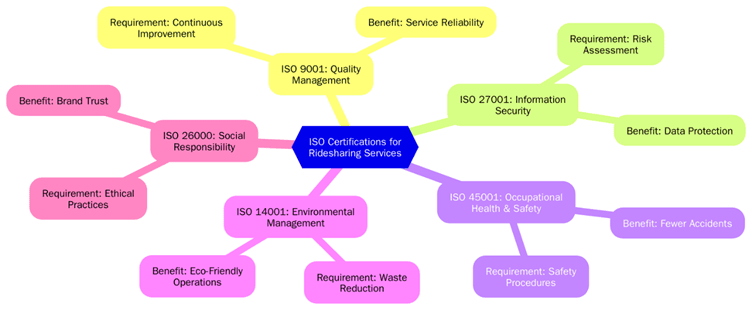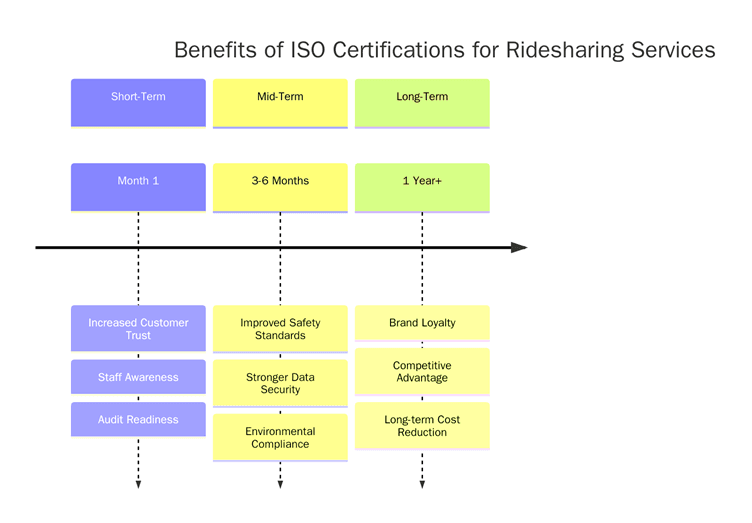ISO Certifications for Ridesharing Services, Requirements and Benefits

Quick Summary
"Ridesharing platforms like Uber and Lyft increasingly rely on ISO certifications to address safety, compliance, and service quality concerns. Key standards include ISO 9001 for consistent quality management; ISO 27001 to protect sensitive user data; ISO 14001 for reducing environmental impact; ISO 45001 for the health and safety of drivers and staff; ISO 39001 to promote road traffic safety; and ISO 26000 for ethical and socially responsible operations. . Certification involves establishing documented processes, internal audits, and third-party assessments. Benefits include greater passenger trust, regulatory alignment, improved operational discipline, and scalability—helping ridesharing services stand out in a competitive and regulation-driven industry"
ISO Standards for Ridesharing Services
In today’s fast-paced mobility landscape, ridesharing services such as Uber, Lyft, and regional alternatives have revolutionized urban transportation. But with this innovation comes a complex web of compliance, security, and quality concerns. That’s where ISO Certifications enter the picture. These internationally recognized standards provide a reliable framework for ensuring passenger safety and sustainable growth.
ISO standards help rideshare operators to build stakeholder trust and drive continuous improvement—globally.
ISO (International Organization for Standardization) develops and publishes globally accepted standards that guide businesses across industries in achieving quality, safety, and efficiency. For ridesharing platforms, adhering to ISO standards helps fulfil legal obligations, ensure data protection, and maintain passenger trust in a highly competitive digital ecosystem.

These standards cover everything from quality management and information security to environmental responsibility and road safety. They serve as compliance benchmarks and as strategic tools that improve reputation and scalability.
If you are looking for ISO certification for Ridesharing Services, contact us today at [email protected] or call +91-8595603096. Visit us at www.pacificcert.com
Applicable ISO Standards for Ridesharing Services
Ridesharing companies fall under several key ISO standards depending on their operational models. Below are the most relevant:
ISO 9001:2015 – Quality Management Systems (QMS)
Ensures consistent quality of services, improves customer satisfaction, and reduces operational errors.
ISO 27001:2022 – Information Security Management Systems (ISMS)
Vital for managing user data security and privacy, especially with GPS tracking, payment data, and app integrations.
ISO 14001:2015 – Environmental Management Systems
Supports sustainable operations by reducing emissions, fuel consumption, and environmental impact.
ISO 45001:2018 – Occupational Health and Safety
Applies to rideshare employees and drivers, promoting safer work environments.
ISO 39001:2012 – Road Traffic Safety (RTS) Management Systems
Targets reduction of traffic incidents and promotes safe driving behaviors.
ISO 26000 – Social Responsibility Guidelines
Encourages ethical operations, stakeholder engagement, and responsible community interaction.
ISO 22301:2019 – Business Continuity Management
Ensures resilience during crises such as cyberattacks, app outages, or driver shortages.
These standards may not be compulsory by law, but their adoption reflects a mature, responsible, and competitive business model.
Click here to find out more applicable standards to your industry
As a trusted certification body, Pacific Certifications provides end-to-end support for ridesharing businesses seeking ISO certifications. While we do not offer consultancy, training, or implementation services, we specialize in conducting impartial audits and issuing globally recognized ISO certificates.
Our auditors work across regions and industries, bringing deep insight into the ridesharing sector. We understand the unique challenges of app-based mobility platforms and customize our audit approach accordingly.
Ready to get ISO certified? For ISO certification for Ridesharing Services, connect with our audit experts via email at [email protected], phone at +91-8595603096.
Requirements of ISO Certifications for Ridesharing Services
Below is a concise breakdown of the requirements of ISO standards for ridesharing services:

ISO 9001:2015 – Quality Management Systems (QMS)
- Define quality policies and objectives.
- Establish process control and documentation.
- Monitor customer satisfaction.
- Perform internal audits and reviews.
- Ensure continual improvement.
ISO 27001:2022 – Information Security Management Systems (ISMS)
- Identify and assess information security risks.
- Implement controls for data protection (encryption, access controls).
- Maintain an incident response plan.
- Ensure regular audits and compliance.
- Protect customer and driver data.
ISO 14001:2015 – Environmental Management Systems
- Define environmental policy and legal obligations.
- Identify environmental impacts (fuel usage, emissions).
- Set sustainability targets and measure performance.
- Maintain documentation and training.
- Promote eco-friendly operations.
ISO 45001:2018 – Occupational Health & Safety (OH&S)
- Identify workplace hazards (e.g., driver fatigue).
- Engage workers in safety programs.
- Provide health & safety training.
- Implement emergency preparedness.
- Monitor incidents and corrective actions.
ISO 39001:2012 – Road Traffic Safety (RTS)
- Set road safety objectives.
- Collect and analyze crash and driving behavior data.
- Train drivers on safe practices.
- Integrate safety into operations and apps.
- Promote continuous safety improvement.
ISO 22301:2019 – Business Continuity Management
- Identify critical business activities.
- Conduct risk assessments and impact analysis.
- Develop recovery plans and backup systems.
- Test continuity plans regularly.
- Ensure service delivery during disruptions.
ISO 26000 – Social Responsibility (Guidance)
- Promote ethical business practices.
- Respect human rights and labor laws.
- Support community and stakeholder interests.
- Ensure transparency and accountability.
- Engage in fair competition and sustainability.
Contact Pacific Certifications for ISO certification for Ridesharing Services at [email protected] | +91-8595603096 | www.pacificcert.com
Benefits of ISO Certifications for Ridesharing Services
Achieving ISO certification isn’t just about compliance—it delivers real, measurable business advantages:

- Customer Trust: ISO 9001 and ISO 27001 build user confidence in service quality and data security.
- Regulatory Compliance: Certifications help meet evolving government mandates and urban transport regulations.
- Global Expansion: ISO certificates serve as entry tickets to new markets and cross-border collaborations.
- Excellence: Reduced errors, fewer complaints, and increased efficiency through process optimization.
- Brand Differentiation: Stand out in a crowded market by showcasing internationally validated standards.
- Driver Safety: ISO 45001 and ISO 39001 reduce workplace hazards and accidents.
- Eco-conscious: ISO 14001 demonstrates environmental responsibility—key for modern brand loyalty.
- Crisis Preparedness: ISO 22301 ensures rideshare continuity amid disruptions.
According to a recent market analysis by MobilityX, over 60% of urban riders prefer rideshare services that publicly commit to data privacy and environmental sustainability. Furthermore, regulatory bodies in Europe and Asia-Pacific are expected to mandate some level of compliance with ISO 27001 and ISO 14001 for app-based transport firms.
Investment in certifications is no longer optional but strategic. Firms lacking certifications may face public backlash, restricted partnerships, or delays in license renewals.
Whether you're a regional mobility startup or an established platform, Pacific Certifications can help you navigate the certification journey with confidence and credibility!
Pacific Certifications is accredited by ABIS, in case you need support with ISO certification for your Ridesharing Services business, please contact us at [email protected] or +91-8595603096
Ready to get ISO 45001:2018 certified?
Contact Pacific Certifications to begin your certification journey today!
Suggested Certifications –
Read More: Pacific Blogs

